Genitals
The Penile Plethysmograph
I had to post this item today, to accompany Alex's "pot-sex" post, only because how often does one get to use the great word "plethysmograph?"
Posted By: Paul - Sat Jul 31, 2021 -
Comments (1)
Category: Medicine, Science, Sexuality, Technology, Genitals
Ferdi Jansen
The artist's homepage. Sadly, she died very young in 1969.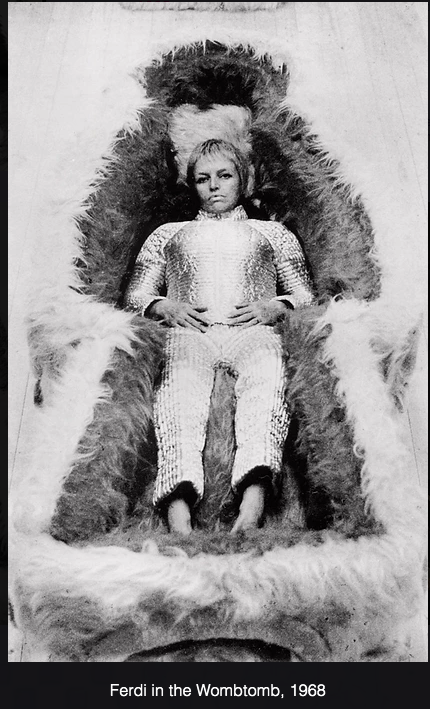
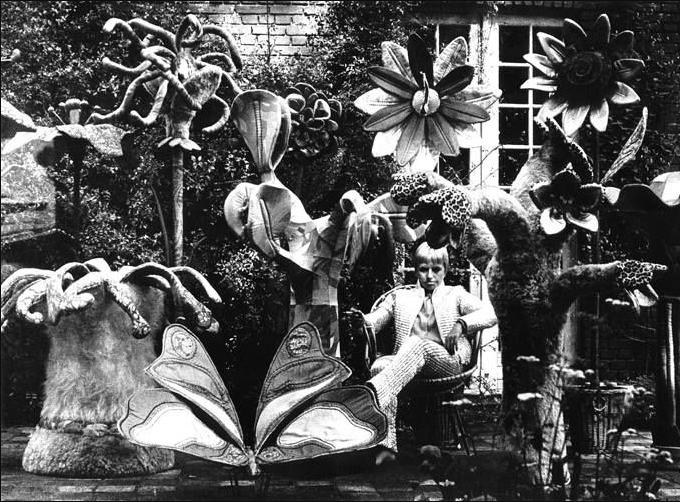
Posted By: Paul - Fri Jul 16, 2021 -
Comments (1)
Category: Art, 1960s, Genitals
Castration and Longevity
Evidence is accumulating that castration can increase a man's odds of living longer.Farmers have long known that castrated sheep live longer than non-castrated sheep. But researchers in New Zealand were recently able to demonstrate, on a molecular level, that castration slows the aging of DNA (in sheep).
The presumption is that what's true for sheep is also likely true for humans. And there's research to back this up. From a 2015 article on BBC.com:
More info: The Lifespan of Korean Eunuchs, Castration delays epigenetic aging and feminizes DNA methylation at androgen-regulated loci
Posted By: Alex - Wed Jul 14, 2021 -
Comments (4)
Category: Genitals, Longevity
Self-castration in early Christianity
Some ancient weirdness: The First Council of Nicaea, in 325 AD, was a meeting of Christian bishops in which they tried to establish the rules and doctrines that all Christians were supposed to follow. Wikipedia says:However, one of the lesser-known rules that the bishops enacted at the Council was to ban men who had castrated themselves from being in the clergy. Because, apparently, self-castration had become something of a fad among early Christians. Enough so that the bishops felt the need to put an official stop to the practice.
The historian Daniel Caner has examined this issue in his 1997 article "The practice and prohibition of self-castration in early Christianity".
Caner notes that the fad had its origin in a passage from the New Testament, Matthew 19:12, in which Jesus appears to endorse the practice of self-castration. As the passage reads in the King James translation:
Most interpreters of the Bible, ancient and modern, argue that when Jesus used the word 'eunuch' he meant it as a synonym for 'celibacy'. Apparently this was a common use of the term 'eunuch' in the ancient world.
Nevertheless, he used the term eunuch. So some early Christians decided the passage should be taken literally. In which case, Jesus seemed to be saying that, while self-castration was not appropriate for all men, for an elite few it was an ideal to strive for. Inspired by this passage, a number of men "took the sickle and cut off [their] private parts."
The most prominent Church father who was said to have castrated himself was Origen of Alexandria (c. 185 - c. 253). But Caner notes that there was an entire sect of early Christians, the Valesians, who embraced the practice. Wikipedia says that, in addition to castrating themselves, "They were notorious for forcibly castrating travelers whom they encountered and guests who visited them."
According to Caner, the more widely adopted Christianity became in the Roman empire, the more the Church tried to present itself as the upholder of mainstream values, and self-castration really didn't fit into that image. Therefore, "Radical manifestations of an ideal de-sexualization... became a 'heretical' threat to the orthodox community."
Posted By: Alex - Fri Jul 02, 2021 -
Comments (5)
Category: Body Modifications, Fads, Religion, Ancient Times, Genitals
Corporate Pubic Hair Shaving
Posted By: Paul - Fri Jun 11, 2021 -
Comments (0)
Category: Hygiene, Advertising, Public Indecency, Genitals, Hair and Hairstyling
Bring Back the Bush
Posted By: Paul - Wed Jan 29, 2020 -
Comments (2)
Category: Annoying Things, Antiques, Anachronisms and Throwbacks, Beauty, Ugliness and Other Aesthetic Issues, Customs, Hygiene, Genitals
Follies of the Madmen #459

Sanitary pad endows woman with power to make flowers sprout from inanimate objects.
Source.
Posted By: Paul - Tue Dec 31, 2019 -
Comments (2)
Category: Body, Genitals, Business, Advertising, Hygiene, Body Fluids, Magic and Illusions and Sleight of Hand, 1960s
Artwork Khrushchev Probably Would Not Have Liked 24
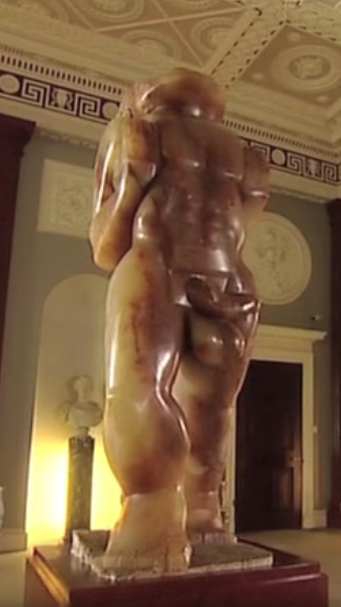
Posted By: Paul - Sat Oct 26, 2019 -
Comments (0)
Category: Art, Avant Garde, 1930s, Genitals
The Seminal Pastille
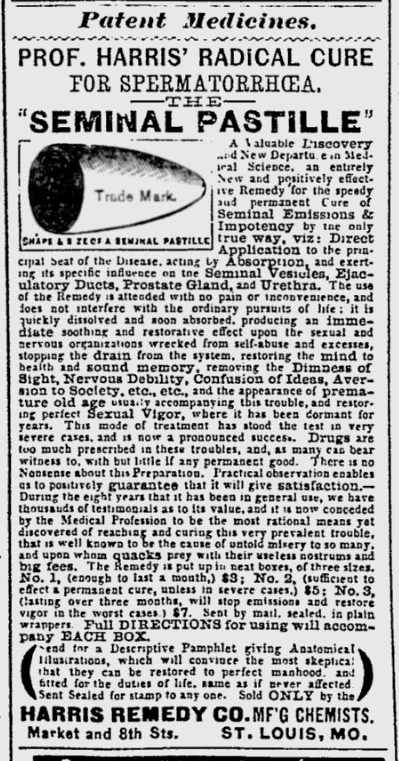
Source.
Posted By: Paul - Wed Apr 10, 2019 -
Comments (3)
Category: Patent Medicines, Nostrums and Snake Oil, Nineteenth Century, Genitals
Coolmen
A new device that promises to help treat male infertility by keeping your little men cool. From the manufacturer's website:More info: India Times,
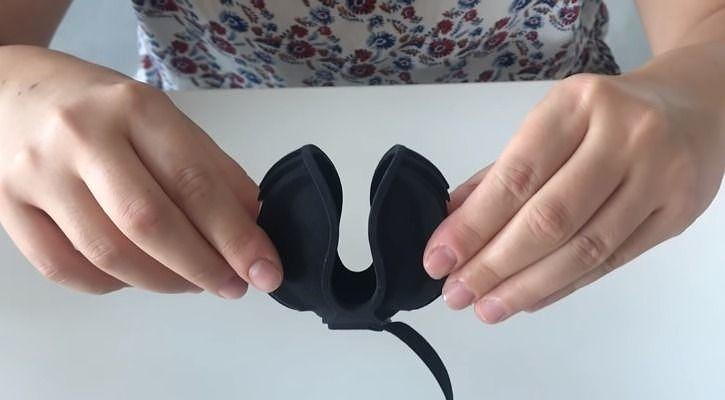
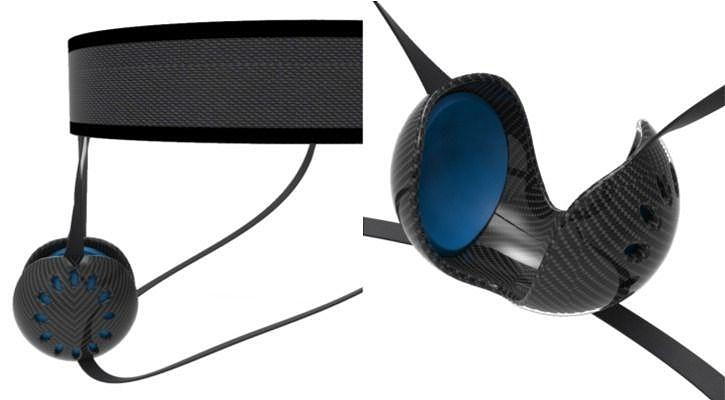
Posted By: Alex - Tue Jan 08, 2019 -
Comments (2)
Category: Inventions, Genitals

| Who We Are |
|---|
| Alex Boese Alex is the creator and curator of the Museum of Hoaxes. He's also the author of various weird, non-fiction, science-themed books such as Elephants on Acid and Psychedelic Apes. Paul Di Filippo Paul has been paid to put weird ideas into fictional form for over thirty years, in his career as a noted science fiction writer. He has recently begun blogging on many curious topics with three fellow writers at The Inferior 4+1. Contact Us |




